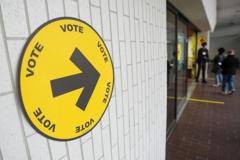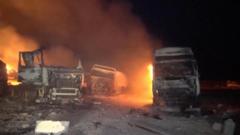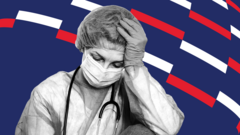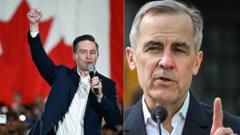In a historic election influenced by US President Donald Trump's actions and comments, Canadians head to the polls, with the race between Conservatives and Liberals tighter than expected.
**Canada's Crucial Election Shakes Up Amidst Trump Turmoil**

**Canada's Crucial Election Shakes Up Amidst Trump Turmoil**
Amid rising tensions from Trump's policies, Canadian voters face a critical decision in their election.
As Canadians prepare to vote in a crucial election on Monday, the political landscape has been significantly altered by US President Donald Trump's recent actions and remarks. Initial predictions had favored a Conservative landslide, but rising nationalist sentiment and discontent over Trump's tariffs pushed Liberal leader Mark Carney into a stronger position. Recent polls indicate a close race, with the Liberals marginally leading.
The campaign took a somber turn following a tragic car ramming in Vancouver that claimed 11 lives. This has prompted both Carney and Conservative leader Pierre Poilievre to adjust campaign schedules to address the crisis. Carney, the incumbent prime minister, emphasized the need for solidarity during difficult times, while Poilievre sought to rally support among communities affected by the tragedy.
The campaign has been deeply influenced by Trump's threats to annex Canada as a "51st state," which stoked populist fervor and escalated Canadian nationalism. Hockey fans notably expressed their emotions by booing the US national anthem, reflecting tensions that have simmered between the two nations. Carney has framed the election as a bulwark against Trump's growing influence, reiterating calls for Canada to strengthen ties with alternative trade partners like the UK and EU.
On the other hand, Poilievre has emerged as the candidate of change, emphasizing the failures of the recent Liberal government amid soaring housing prices and rising crime rates. He appeals to those frustrated with the status quo and promotes a vision of affordability and better living conditions. With Ontario holding a majority of parliamentary seats, Poilievre's campaign focus in the province is crucial.
Smaller parties like the New Democratic Party and the Bloc Québécois are struggling, with the NDP leader Jagmeet Singh facing challenges in retaining support after the Vancouver tragedy affected his campaign events. Historically, Canada has oscillated between Liberal and Conservative governments, and while Trump's involvement in the election conversation has been negatively framed, he has refrained from directly commenting on the outcome.
As polling approaches, a record turnout of over 7 million Canadians have voted early, underscoring the high stakes of this election. Voting begins at 08:30 local time in Newfoundland and Labrador, with results anticipated as the last polls close in British Columbia. This election represents a critical moment for Canada, as the nation grapples with its identity amidst external pressures and internal challenges.























